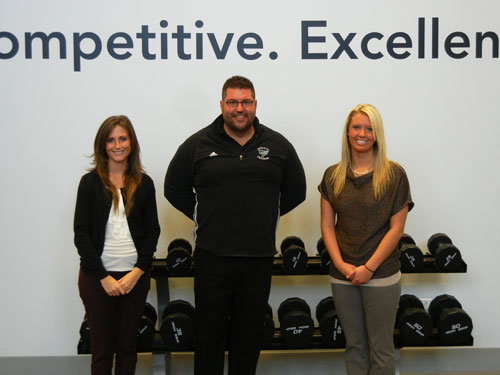At National University, DC students interested in sports medicine have great opportunities to work with athletes alongside our faculty experts. For example, National University faculty member, Thomas Solecki, DC, is also a team physician for both Northwestern and Benedictine University in Illinois. He has traditionally brought DC students from NUHS with him as he works at the colleges’ team practices and sporting events.
“I’ve had more than 125 students accompany me over the years for observation and treatment of athletes on college teams,” says Dr. Solecki. He and the students work with all men and women’s sports at both schools, including: football, basketball, swimming, diving, baseball, softball, volleyball, track, cross country, fencing, lacrosse and cheerleading.

Two DC students at National, Ashley Welch and Audra Lance, have worked with Dr. Solecki at both colleges on an ongoing basis oves at the colleges uses everything we’ve been learning in the classroom at National.” The students also learn to work alongside other professionals. A typical college sports medicine team may also have an orthopedic surgeon, a physical trainer, a nutritionist, a sports psychologist and performance coaches.
Ashley and Audra say they may be treating up to eight athletes at the same time at any college work visit, so it keeps them very busy. “In addition, we’re learning strength training, functional rehabilitation, performance training, acute care and soft tissue manipulation. We also learn how to properly complete the paperwork involved in treating the athletes and how to bill for services as a sports medicine contractor.”
Dr. Solecki didn’t always get paid for working with college teams, especially in his first few years. “Sports medicine is a field where you initially make connections and open doors primarily by volunteer work. The teams first learn to value what you do, and then may start offering payment. Or, you build relationships that lead to new opportunities. For example, athletic trainers are a very tight-knit group. If they see you doing well for one team, they will recommend you to other teams they work with.”
Recently, Dr. Solecki also became an instructor for the National Academy of Sports Medicine. The NASM is a governing agency for programs in personal training, fitness nutrition specialties, corrective exercise and performance enhancement specialties.
Dr. Solecki says his experience and the experience of his students working with the college teams, also reinforces the primary care emphasis of a National University education. “If I went to another school that strictly taught me how to adjust people all day, I would be ill-prepared to do what I do.”
“My main focus with the teams is to operate as a primary care physician. There’s no better arena for primary care experience than in sports medicine. You have to know about X-rays, lab work, emergency medicine, and more. After all, you’re not just treating a sports injury, you’re treating an athlete who may come down with a viral infection, or skin lesion, or he or she may be a post-surgical patient,” says Dr. Solecki. “You’re not just dealing with strains and sprains, you’re dealing with a whole person who just happens to be playing a sport. That’s why a primary care education from National is a great foundation for sports medicine.”




0 Comments